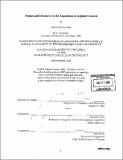| dc.contributor.advisor | Suzanne Flynn. | en_US |
| dc.contributor.author | Adler, Allison Nicole | en_US |
| dc.contributor.other | Massachusetts Institute of Technology. Dept. of Linguistics and Philosophy. | en_US |
| dc.date.accessioned | 2009-08-27T14:08:14Z | |
| dc.date.available | 2009-08-27T14:08:14Z | |
| dc.date.copyright | 2006 | en_US |
| dc.date.issued | 2006 | en_US |
| dc.identifier.uri | http://hdl.handle.net/1721.1/37417 | |
| dc.identifier.uri | http://dspace.mit.edu/handle/1721.1/37417 | en_US |
| dc.description | Includes bibliographical references (p. 211-219). | en_US |
| dc.description | Thesis (Ph. D.)--Massachusetts Institute of Technology, Dept. of Linguistics and Philosophy, 2006. | en_US |
| dc.description.abstract | (cont.) I suggest that the control principles are intact, and that a separate aspect of grammar is responsible for these non-adult interpretations. I argue that adjunct attachment height, which is crucial to determining what type of control will obtain in the adult grammar, must be learned from the input and exhibits gradual development. If the child has failed to embed an adjunct clause at a sufficiently low level (e.g., within the VP), the null subject will fall into the domain of discourse control rather than syntactic control. If these claims are correct, we expect children to show adult-like control in adjuncts, albeit contingent upon the adjunct type. Three experiments were conducted to test these predictions. We find correlations between non-adult control and non-adult pronoun interpretation, both argued to be due to the misattachment of the adjunct clause. Children's interpretations of PRO in misattached adjuncts are also similar to those in true discourse control contexts, as expected. | en_US |
| dc.description.abstract | This dissertation is a study of null subjects in adjunct clauses in English. The goal is twofold: to establish a comprehensive theory of control in adjuncts, and to utilize this theory to understand the adjunct control interpretations of children aged 3-6. The theoretical basis of this work is Landau (2000, 2001), who characterizes the complement control mechanism as a syntactic Agree relation (Chomsky 1995, et seq.). I argue that the same mechanism governs control into low-attaching adjuncts (like before, after, while and without) as well. High-attaching adjuncts and gerund subjects, on the other hand, are subject to discourse-governed control rather than the syntactic Agree relation. I argue that the topic of the sentence is the controller in these cases. This theory makes certain predictions for acquisition. We expect control in verb complements and low-attaching adjuncts to develop at the same age, given that they are governed by the same mechanism. Discourse-governed control, on the other hand, is predicted to develop much later in childhood. However, many researchers have observed that control in some low-attaching adjuncts may be delayed until age 5, beyond the age at which children master complement control. | en_US |
| dc.description.statementofresponsibility | by Allison Nicole Adler. | en_US |
| dc.format.extent | 230 p. | en_US |
| dc.language.iso | eng | en_US |
| dc.publisher | Massachusetts Institute of Technology | en_US |
| dc.rights | M.I.T. theses are protected by
copyright. They may be viewed from this source for any purpose, but
reproduction or distribution in any format is prohibited without written
permission. See provided URL for inquiries about permission. | en_US |
| dc.rights.uri | http://dspace.mit.edu/handle/1721.1/7582 | en_US |
| dc.rights.uri | http://dspace.mit.edu/handle/1721.1/37417 | en_US |
| dc.subject | Linguistics and Philosophy. | en_US |
| dc.title | Syntax and discourse in the acquisition of adjunct control | en_US |
| dc.type | Thesis | en_US |
| dc.description.degree | Ph.D. | en_US |
| dc.contributor.department | Massachusetts Institute of Technology. Department of Linguistics and Philosophy | |
| dc.identifier.oclc | 123083349 | en_US |
